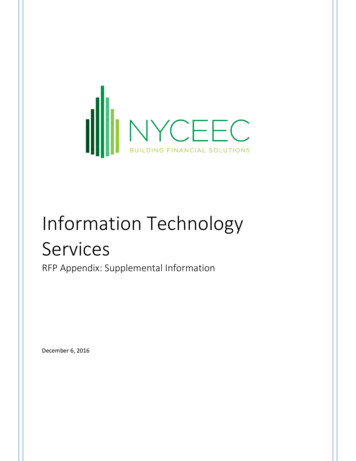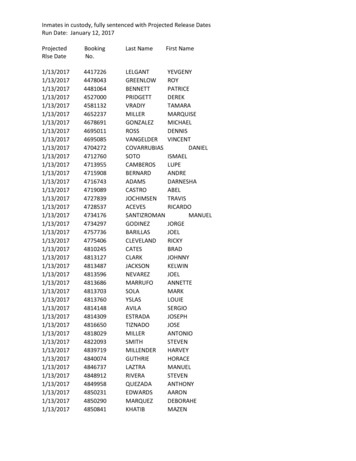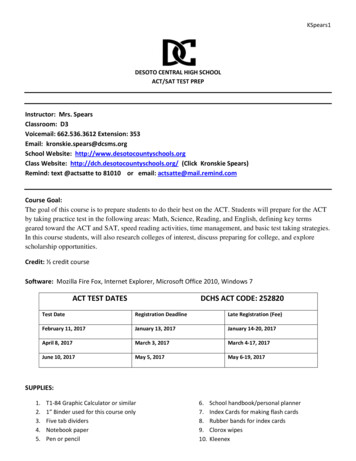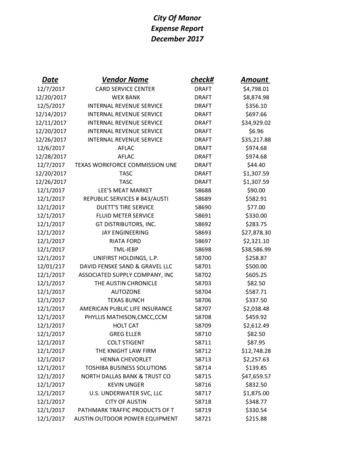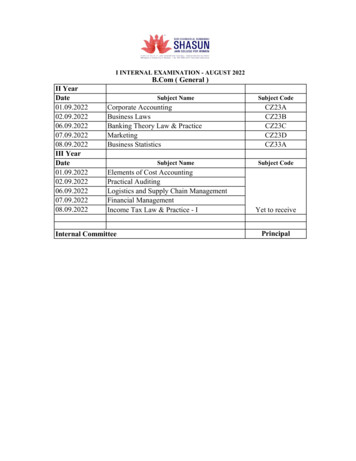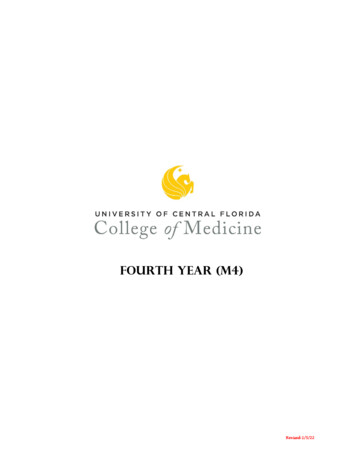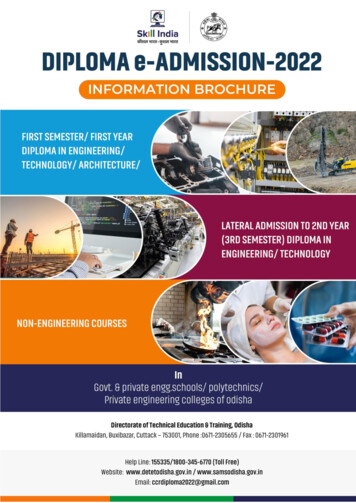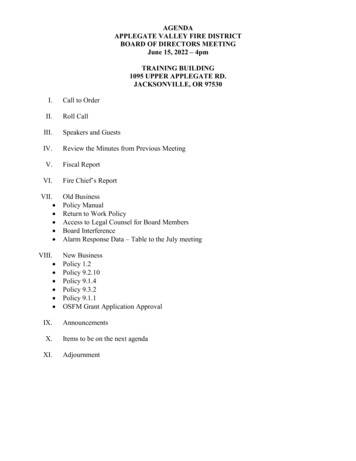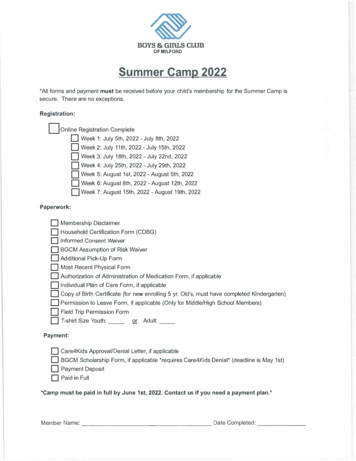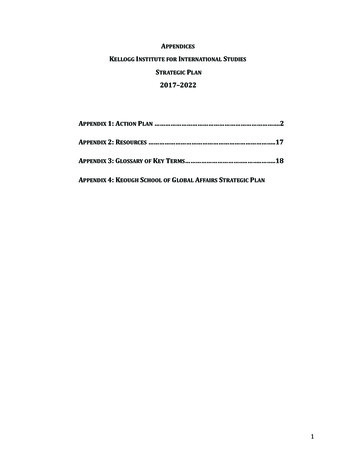
Transcription
APPENDICESKELLOGG INSTITUTE FOR INTERNATIONAL STUDIESSTRATEGIC PLAN2017–2022APPENDIX 1: ACTION PLAN .2APPENDIX 2: RESOURCES .17APPENDIX 3: GLOSSARY OF KEY TERMS . . .18APPENDIX 4: KEOUGH SCHOOL OF GLOBAL AFFAIRS STRATEGIC PLAN1
APPENDIX NO. 1: ACTION PLANThis appendix highlights speci2ic actions that we will take toward achieving the threeprincipal goals outlined by the Kellogg Institute’s Strategic Plan, namely (I) promotingresearch excellence, (II) providing exceptional educational opportunities, and (III)sustaining key institutional partnerships and building new linkages. In the development ofthe plan and appendices, Kellogg Institute leadership consulted broadly with Notre Damefaculty and leadership, the Kellogg Faculty Committee and Advisory Board, Kellogg staff andstudents, Keough School leadership, and outside experts. Hence, this document discussesour strategic aims and how we hope to achieve them, focusing on a 2ive-year period (2017–22) in the context of our historic and ongoing achievements.Goal I: Promoting Research ExcellenceObjective 1. Identify and invest in key areas within the study of democracy and humandevelopment where Kellogg can best contribute to a deep scholarly agenda, whilecontinuing to provide broad support for research that advances our understanding ofboth themes and the intersections between the two.Since the 1980s and 1990s when the Kellogg Institute gained world-class prominence forits research on democracy in Latin America, Kellogg has been and continues to be theprincipal institutional home for the study of comparative politics, democratization, andLatin America at the University of Notre Dame. Over the past decade, Kellogg hassigni2icantly enhanced the breadth and visibility of human development studies bypromoting the Ford Program as a vehicle for 2ield-based research and more recently bycatalyzing two multiyear research projects that engage scholars and developmentpractitioners on the relationship between human dignity and human development and onaccompaniment as a methodological approach to development.Among the Institute’s hallmark research projects is the Varieties of Democracy Project (VDem), to which Kellogg awarded its 2irst major collaborative grant of 70,000 in 2010. Theproject has since attracted more than 10 million in external funding. With institutionalhomes at both the Kellogg Institute and the V-Dem Institute at the University of Gothenburg(Sweden), V-Dem involves a leadership team of 2ifteen social scientists spanning threecontinents and nearly 3,000 researchers in more than 160 countries. V-Dem has producedthe largest and most comprehensive dataset of its kind, covering more than 16 million datapoints across 173 countries from 1900 to the present. With the public release of its datasetin January 2016, V-Dem is becoming a transformative tool for democracy researchworldwide.The research of Kellogg faculty fellows not only investigates the core key themes ofdemocracy and human development but also explores the integration of the two. Notableongoing work includes groundbreaking research on the relationships between criminalviolence and the state in Latin America, on education and citizenship in Mali, and on nichesof effective governance within weak states in West Africa. In order to deepen its scholarlycommunity’s research excellence while building upon the success of key collaborativeprojects, the Institute intends to focus its attention by investing in high-impact issue areaswithin the broad themes of democracy and human development.KELLOGG INSTITUTE STRATEGIC PLAN 2017–222
APPENDIX NO. 1: ACTION PLANOver the next Sive years, Kellogg will advance research in key focal areas with thepotential to generate sustained, dynamic collaborations and multiple scholarlyoutputs by the following actions:1. Establish Kellogg research clusters related to a select number of focal areas within thestudy of democracy and human development.a. Establish a process for eliciting and evaluating faculty proposals to selectresearch areas that emerge from the shared interests and needs of Kelloggfaculty while taking into consideration the Institute’s priorities and strengths.b. Potential clusters might include, for example: understanding the relationshipsbetween violence, governance, and human development; studying the problemof weak and vulnerable democracies in the contemporary world; fostering moreintegrative approaches to human development in theory and practice; studyingthe interrelationships between religious communities and social policies indemocratic systems; exploring how to link 2ield-based microeconomic insights indevelopment with macroeconomic development policies and democraticinstitutions; and examining the interdependence of the rule of law and economicdevelopment in democratic constitutional systems.c. Facilitate the clusters by taking into account the best practices of peerinstitutions, including the benchmarking of peer institutions already undertakenby the Institute.d. Direct resources—2inancial, programmatic, human, and administrative—tosupporting each of the research clusters.e. Track the impact of the clusters in terms of catalyzing partnerships acrossdepartments, colleges/schools, and with other institutions of strategicimportance. Track also resultant publications, external funding, majorconferences or colloquia, and the inclusion of the extended Kellogg community,including, e.g., faculty fellows, current and former visiting fellows, and currentand former doctoral student af2iliates.2. Explore international education and its relations to democracy and development as asignature research area.a. In collaboration with the Institute for Educational Initiatives and other relevantUniversity units, support a needs assessment related to international educationresearch at Notre Dame.b. Pursue 2ield-based research projects in international education through the FordProgram.c. Consider funding an additional faculty position in international education, incollaboration with the deans of the College of Arts and Letters and the KeoughSchool and the relevant department chairs.KELLOGG INSTITUTE STRATEGIC PLAN 2017-223
APPENDIX NO. 1: ACTION PLAN3. Collaborate with relevant University academic units, especially the Keough School andthe College of Arts and Letters, to recruit, support, and retain outstanding faculty withexpertise on Kellogg core themes.a. Leverage Kellogg resources to facilitate the most effective and productiveengagement of Keough School faculty hires and to work with the School anddepartments to fund and support relevant research, as well as engage newfaculty members in the Kellogg intellectual community. Through strategicresource support, target thematic areas where the Institute’s prior commitmentsand strategic priorities align with Keough School needs.b. Fund nine existing faculty positions in whole or in part, including three ineconomics, two in political science, one each in sociology and in anthropology,and two directly related to the Institute’s 2ield-based research in humandevelopment.c. In collaboration with other University units, fund the equivalent of twoadditional faculty positions, with the aim of retaining the Institute’s historicdepth in comparative politics and democracy and securing faculty hires in keyKellogg thematic areas, including in international economic development,Catholic social thought and human development, and international education.(Refer to Goal 1, Action step 2c.)4. Support faculty fellow research on a range of topics broadly related to the core Kelloggthemes of democracy and human development.a. Maintain support for individual and collaborative research grants, travel grants,the funding of thematic working groups, and resources for research conferencesand for scholarly visitors.b. Evaluate the integration of new and existing faculty into the Kellogg communityof scholars in the following ways:i. Track leadership in collaborative research projects that result in externalfunding and publications; participation in Kellogg conferences, seminarseries, working groups, and committees; effective use of Kellogg researchsupport for individual and collaborative projects; publication in KelloggWorking Paper Series.ii. Track new research products resulting from Kellogg support, includingexternal funding, publications, and ongoing collaborations.c. In each of the next 2ive years, work with faculty fellows to continue to organize atleast one major international research conference on an area related to astrategic Kellogg theme.5. Disseminate Kellogg research through strategic use of the Kellogg Institute WorkingPaper Series and the Kellogg Institute Book Series in Democracy and Development withthe University of Notre Dame Press.KELLOGG INSTITUTE STRATEGIC PLAN 2017-224
APPENDIX NO. 1: ACTION PLANObjective 2. Cultivate and support a vibrant, interdisciplinary, and integrativeintellectual community encompassing faculty, students, and external scholars andpractitioners.Building upon its historically strong, interdisciplinary community, the Institute will advancefurther opportunities for scholarly exchange and collaborative research, including throughits two primary programs for engaging external scholars: Visiting Fellows andDistinguished Research Af2iliates.Each year, the Institute hosts between eight and 12 visiting fellows. While continuing todraw outstanding scholars in democracy studies, Kellogg has more than doubled the cohortof visiting fellows in human development since 2011. Fellows’ research has contributed toadvancing understanding in the Institute’s key thematic areas both during their period ofresidence and often long afterward. Kellogg opportunities have also helped advance visitingfellows’ academic careers. Of the 13 fellows who have come to Kellogg as post-docs since2011, 85 percent have gone on to tenure-track positions.As Kellogg institutionalizes its Distinguished Research Af2iliates Program, we expect togenerate further collaborative, high-impact research related to key Kellogg themes. Pilotedin 2015, the program comprises a revolving cohort of six outstanding external scholars intwo-year collaborations with the Kellogg research community. Scholars’ respectivedisciplines have included political science, economics, sociology, and internationaleducation. In addition to advising the Institute, DRAs nurture new initiatives, developresearch projects with faculty fellows and doctoral students, and help disseminate Kelloggresearch across scholarly and policy audiences.A model of Kellogg community engagement, the October 2016 conference “TransitionalJustice and the Struggle against Impunity in Mexico,” cohosted by the Kellogg Institute andCentro de Investigación y Docencia Económicas (CIDE) in Mexico City, involved a diversecohort of scholars and practitioners. Spearheaded by Kellogg Faculty Fellow and AssociateProfessor of Political Science Guillermo Trejo, the conference included three former Kelloggvisiting fellows: Mariclaire Acosta, director of the Mexican of2ice of Freedom House, LeighPayne, professor of sociology and Latin American studies at the University of Oxford, andSandra Ley, assistant professor at CIDE, as well as Kellogg PhD Fellow Juan Albarracín andLLM alumnus Fabián Sánchez Matus. The Institute foresees building upon events such asthis to further integrate current and former members of the Kellogg community.Over the next Sive years, we plan to enrich the Kellogg research community in thefollowing ways:1. Integrate Kellogg visiting fellows more fully into the research agenda and scholarlycommunity, including in new research clusters.a. Facilitate opportunities for visiting fellows to teach elective courses for theKeough School Master of Global Affairs and for the undergraduate Minor inInternational Development Studies.KELLOGG INSTITUTE STRATEGIC PLAN 2017-225
APPENDIX NO. 1: ACTION PLANb. Assess how experience as a visiting fellow at Kellogg yields returns for scholarlyproduction and other positive career impacts by administering an annual writtenexit survey. Monitor visiting fellows’ ongoing involvement in the Kellogg researchcommunity in terms of collaboration in research, participation in conferencesand colloquia, and publication in the Kellogg Institute Working Paper Series andthe Kellogg Institute Book Series in Democracy and Development with theUniversity of Notre Dame Press.c. Build upon existing networks to advertise the Visiting Fellows Program andmaintain strength of applicants in democracy studies, Latin American politics,and human development.d. Attract outstanding post-doctoral scholars to increase the number who receiveKellogg Visiting Fellowships.2. Institutionalize the Distinguished Research Af2iliates (DRA) program, bringing in highlevel scholars and actively involving them in the Institute’s intellectual community.a. Track Distinguished Research Af2iliates’ engagement in terms of developingresearch projects with faculty fellows and doctoral students, nurturing newresearch initiatives, participating in Institute academic forums, and engagingwith the Kellogg community of faculty and students. Monitor DRAs’ ongoingengagement following their terms.3. Facilitate ongoing faculty and doctoral student engagement through Kellogg workinggroups.a. Foster opportunities to develop ideas that may result in formal work products,such as new interdisciplinary collaborations, conferences, or publications, andtrack these outputs through working groups’ annual renewal reports. Supportworking groups in sponsoring visiting lectures and in facilitating opportunitiesfor doctoral students to receive feedback on their work.4. Repurpose parts of the Hesburgh Center for International Studies into spaces conduciveto collaborative work and intellectual exchange among Kellogg-af2iliated faculty,students, and visitors.a. With the opening of the Keough School in fall of 2017, Kellogg administrativestaff will transition to Jenkins Hall. Faculty and visiting fellow of2ices will remainin the Hesburgh Center. Anticipating this transition, involve faculty and studentsin the process of redesigning the Hesburgh Center space presently occupied byadministrative staff.KELLOGG INSTITUTE STRATEGIC PLAN 2017-226
APPENDIX NO. 1: ACTION PLANObjective 3. Generate and disseminate scholarship that has the potential to have asigni?icant in?luence on policymaking and on the practice of democracy and humandevelopment.Kellogg scholars work across disciplinary boundaries in search of integrative solutions tocontemporary human problems. As part of the Keough School, which aims to makeimportant contributions to policy and the practice of global affairs, Kellogg intends tocontinue to advance innovative, impact-oriented scholarship with renewed vigor.The Ford Program brought to the Institute a vehicle for distinctive 2ield-based research,with an emphasis on community engagement and on the principles of Catholic socialthought. Over the past 2ive years, the Program has been successful in linking the globalresearch agenda to local communities in Uganda and Kenya. With Ford Program support,Kellogg faculty fellows have conducted innovative research in East Africa on incomegeneration and savings, entrepreneurship and mentorship, and new approaches to qualityeducation.The new Kellogg Global Leadership Program presents an additional opportunity forfostering policy-relevant research on ethical, effective leadership. Other research by Kelloggfaculty fellows is also informing and in2luencing policy. The V-Dem project, for instance, isbeing used as the source for several indicators for measuring progress toward realization ofthe UN Sustainable Development Goals, and the policy implications of scholars’ work oncriminal violence in Mexico is under public discussion there.Over the next Sive years, we will advance impact-driven, policy-relevant research atKellogg by the following actions:1. Disseminate research with potential to make important contributions to developmentpractice to relevant policy audiences through targeted publications, conferences, andcollaboration with Keough School colleagues.a. Support the development of policy-relevant publications such as case studiesand policy briefs based on the Ford Program’s 2ield research and the developingresearch of the Global Leadership Program and the Keough School’s IntegrationLab (i-Lab). Promote and track the dissemination of research in policy circles.b. Publicize policy-relevant research through Kellogg vehicles, especially thewebsite and annual report.2. Attract among Kellogg visiting fellows leading policy makers, journalists, and otherexperts who can assist in bridging academic research and real-world practice.a. Continue to offer at least one Hewlett visiting fellowship annually to apractitioner from outside academia to engender dialogue between high-levelscholarship and public policy.3. Advance the Ford Program as a platform for research that explores the impact of appliedCatholic social teaching on human development, creating a global network ofresearchers and practitioners and expanding its geographic scope.KELLOGG INSTITUTE STRATEGIC PLAN 2017-227
APPENDIX NO. 1: ACTION PLANa. Convene key collaborators, including international scholars and practitioners, tolearn from existing research models of applied Catholic social teaching and togenerate further research-related partnerships.b. Building upon the Ford Program’s research in East Africa, consider expandingthe geographic scope to other areas, such as Bangladesh, Haiti, and Peru, wherethe Congregation of Holy Cross has a longstanding presence.c. Develop further the Ford Program’s research portfolio in integral humandevelopment to conduct policy-relevant research in public health andgovernance, among other issues, while continuing to develop the existingresearch in entrepreneurship and education.4. Use the newly established Kellogg Institute Global Leadership Program to fosterresearch that examines effective, ethical leadership in public and civic life.a. Engage experienced global leaders and promising young professionals from thepublic and private sectors to foster policy-relevant research, including theproduction of curricula, case studies, and policy papers related to key questionsof public and civic life.Goal II: Providing Exceptional Educational OpportunitiesObjective 1. Attract outstanding doctoral candidates, foster and support their capacityto conduct original, high-quality research on Kellogg core themes, and integrate theminto a distinctive, interdisciplinary scholarly community.For more than a generation, Kellogg has helped to attract and develop outstanding PhDstudents, especially in Latin American politics. Former students now have tenuredpositions at institutions such as King’s College, London, the Massachusetts Institute ofTechnology, the University of Oxford, the University of Pittsburgh, and the University ofTexas at Austin, as well as at the most prestigious research centers and universities in LatinAmerica. Others hold positions at the World Bank, International Monetary Fund, UnitedNations, Organization for Economic Cooperation and Development, Inter-American Court ofHuman Rights, and Federal Reserve System.Kellogg support for doctoral students begins before they arrive at Notre Dame andcontinues throughout their training and thereafter. Through the PhD Fellowship program,Kellogg provides 2ive years of supplemental 2inancial support to outstanding new doctoralstudents, supporting four to 2ive new fellows annually and helping academic departmentsto recruit the best applicants. Additionally, yearlong Dissertation Year Fellowships provideselect funding to a highly competitive, interdisciplinary cohort.The new Doctoral Student Af2iliates program, introduced in 2015, expands Kellogg’s reachamong graduate students and further integrates them into a vibrant intellectualcommunity. The number of doctoral students af2iliated with Kellogg has doubled to morethan 100, primarily in the social sciences but including new disciplines such as theKELLOGG INSTITUTE STRATEGIC PLAN 2017-228
APPENDIX NO. 1: ACTION PLANbiological sciences, engineering, and law. The af2iliates program also serves to moreeffectively channel Kellogg resources. In the past 2ive years, Kellogg research andprofessionalization grants for doctoral students have increased by more than 50 percent.Many doctoral students collaborate with faculty fellows on research, publishing withdistinguished coauthors early in their careers. Through the distinctive resources itprovides, Kellogg has a direct impact in moving doctoral students to graduation.Across the University, doctoral programs are in a dynamic state. Financing structures, thelength of doctoral studies, teaching responsibilities, and University-funded postdoctoralopportunities are being reevaluated. To continue to provide value-added support andformation for doctoral candidates, Kellogg plans to adapt our support to Notre Dame’sevolving needs and opportunities.Over the next Sive years, Kellogg will provide exceptional educational opportunitiesfor doctoral students, emphasizing research training and professionalization in thefollowing ways:1. Cooperate closely with relevant Notre Dame departments and schools to help identifyand recruit outstanding doctoral candidates to the University and to the KelloggInstitute.a. Meet annually with the directors of graduate study to optimize Kellogginvolvement in recruitment of doctoral candidates.b. Harness Kellogg strategic partnerships in countries such as Mexico, Chile, andBrazil to promote doctoral study at Notre Dame.c. Increase awareness of the support Kellogg provides to doctoral students,including research funding, the Kellogg PhD Fellowship, and other bene2itsassociated with doctoral student involvement in the Institute.2. Continue to prioritize robust 2inancial support and enhanced opportunities forprofessionalization for doctoral students from a variety of disciplines whose workresonates with core Kellogg themes, while also examining closely the speci2ic forms ofsupport in order to adapt to the changing environment for doctoral studies at theUniversity.a. Track and measure the impact of Kellogg investment on doctoral students,including resultant publications and conference papers. Administer an annualwritten exit survey and interview and monitor the impact of Kellogg support ongraduates’ professional development by tracking the career placement of formerPhD fellows.b. Encourage doctoral student–led scholarly initiatives such as conferences,thematic workshops, and visits and lectures by distinguished external visitors.c. Expand support for doctoral students to present their research at conferencesand to receive specialized training not available at the University.KELLOGG INSTITUTE STRATEGIC PLAN 2017-229
APPENDIX NO. 1: ACTION PLAN3. Integrate doctoral students more fully into Kellogg research activities by involving themin the planning and implementation of the Institute’s new research clusters.4. Offer Doctoral Student Af2iliates opportunities to build a community of intellectualexchange and solidarity, both with one another and with faculty, visitors, andundergraduates, including by repurposing parts of the Hesburgh Center forInternational Studies.Objective 2. Focus the Institute’s undergraduate initiatives on providing outstandingstudents with exceptional research training and experience at the University and in the?ield; unique global experiential learning opportunities that help them become ethical,transformative leaders; and preparation for graduate-level study and professionalopportunities related to core Kellogg themes.Building upon our longstanding and steadfast commitment to doctoral students, theInstitute has developed exemplary vehicles for undergraduate engagement, including theKellogg International Scholars Program and the Minor in International DevelopmentStudies, which are today among the most highly regarded and sought-after undergraduateopportunities at the University.The Kellogg International Scholars Program (Kellogg ISP) attracts the most academicallymotivated undergraduates. With 64 students currently involved as Kellogg InternationalScholars, the program fosters students’ capacity for research through one-on-onementoring and supporting them in the development of their own research projects. Since2003, the Kellogg ISP has contributed to Notre Dame’s efforts to increase both the numberof national fellowships won by undergraduates and the percentage who pursue PhDs. Its108 alumni have gone on to highly ranked graduate programs at universities such as Duke,Columbia, Georgetown, Harvard, Oxford, Princeton, and Stanford, to name a few. They workfor the US State Department, the Department of the Treasury, and the Department ofJustice. In just the past 2ive years, Kellogg ISP alumni and current students have wonprestigious fellowships that include three Rhodes, two Truman, and three Borenscholarships and seven Fulbright awards.Since 2010, Kellogg has administered the Minor in International Development Studies, oneof the University’s most demanding and popular interdisciplinary minors. With anincreasing number of graduates each year—37 to date—the minor currently enrolls morethan 70 students and includes rigorous training in research methods, culminating in asenior capstone project based on overseas 2ield research. Graduates represent all theUniversity’s colleges; 35 percent have gone on to graduate or medical school while otherswork for domestic or international NGOs.More generally, Kellogg is also supporting independent international research by a growingnumber of undergraduate students. Through the Experiencing the World Fellowships andKellogg/Kroc Undergraduate Research Grants, student 2ield projects have increased bymore than 150 percent in the past 2ive years.KELLOGG INSTITUTE STRATEGIC PLAN 2017-2210
APPENDIX NO. 1: ACTION PLANOver the next Sive years, the Institute will continue to bolster undergraduateopportunities by the following actions:1. Strengthen the Kellogg International Scholars Program, expanding it to the equivalent ofan undergraduate honors program within the Keough School and including studentsand faculty from all the School’s institutes and centers.a. Enlarge the applicant pool, increasing the program’s selectivity and the caliber ofits students.b. Attend the First Year of Studies Advisors’ meeting each year and host a KelloggISP Research Night to increase awareness of the program.c. Incorporate additional advanced research training, including researchworkshops with faculty, and connect students to multiple opportunities forpersonal and professional development. Leverage alumni networks to facilitateopportunities for students’ professional development, including signatureforums like the fall 2017 Kellogg ISP reunion.d. Offer new opportunities for Kellogg International Scholars to obtain 2inancialsupport for research over fall, winter, and spring breaks and to present researchat conferences.e. Continue our success in assisting Kellogg-af2iliated undergraduates to secureprestigious fellowships.f. Check in with faculty mentors once each semester for suggestions and feedback.g. Continue surveying students twice a semester to solicit ideas related to programimprovement and conduct an exit survey at graduation.h. Survey alumni every three years to assess the impact of the Kellogg ISP on theirprofessional and academic careers.i.Present the Kellogg ISP at regional and national conferences to raise theprogram’s pro2ile and share the concept with other universities.2. Enhance the Minor in International Development Studies (MIDS).a. Dedicate the Kellogg faculty, 2inancial, and administrative resources necessary tomaintain and deepen the minor’s characteristic orientation toward fostering2irst-rate undergraduate 2ield research and developing students professionallyand for future studies.b. Continue to survey students upon graduation to solicit feedback about theprogram and to track students’ professional and academic progression.c. Survey alumni every three years to assess the impact of their Kelloggexperiences on their career choices.KELLOGG INSTITUTE STRATEGIC PLAN 2017-2211
APPENDIX NO. 1: ACTION PLAN3. For both the Kellogg ISP and the MIDS, further leverage international partnerships forpurposes of connecting undergraduate students with research opportunities and globalexperiential learning opportunities.4. Continue to develop and support undergraduate student-initiated and student-ledprogramming, especially opportunities to present research, such as the annual KelloggHuman Development Conference.5. Develop new initiatives aimed at fostering greater engagement of 2irst-yearundergraduates with the Institute to help connect them to Kellogg research andopportunities earlier in their college trajectories.6. Repurpose parts of the Hesburgh Center for International Studies to facilitatecollaboration and exchange among undergraduate and doctoral students, Kelloggfaculty, and visitors.Objective 3. Explore and develop possibilities for new educational initiatives that ariseout of Kellogg thematic interests and expertise in response to new Keough Schoolopportunities.With the opening of the Keough School, the Kellogg Institute is poised to consider thedevelopment of new educational offerings, contributing to the Master of Global AffairsProgram (MGA), and ensuring the active presence of Kellogg themes in the new School.Additionally, the new Global Leadership Program (GLP) presents unique possibilities fordeveloping curricular offerings in the Keough School at the undergraduate and MGA levels.In the past year, the Institute has helped sponsor several leadership training seminars,which build upon the Institute’s strengths and exhibit the potential for program growth. In
the College of Arts and Letters, to recruit, support, and retain outstanding faculty with . fellows' academic careers. Of the 13 fellows who have come to Kellogg as post-docs since 2011, 85 percent have gone on to tenure-track positions. . A model of Kellogg community engagement, the October 2016 conference "Transitional
